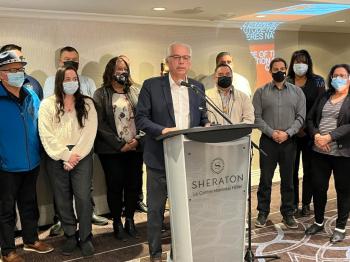Image Caption
Summary
Local Journalism Initiative Reporter
Windspeaker.com
Chiefs of the Assembly of First Nations Quebec-Labrador (AFNQL) will be establishing an Office of Self-Determination and Self-Government.
The decision was made after a two-day meeting of chiefs in Montreal.
“It’s also a demonstration that we will stand up to colonial governments who would rather see us sitting still and be quiet,” said AFNQL Chief Ghislain Picard at a press conference April 28.
Despite the Quebec government having unanimously adopted the United Nations Declaration on the Rights of Indigenous Peoples (UNDRIP) in October 2019, Picard said that three years later the government has yet to engage the AFNQL toward UNDRIP’s implementation.
“I think it's a very good demonstration of where certainly they sit when it comes to Indigenous rights. I would even go as far as to say maybe they understand too well what that implies and that’s why we see so much stalling on their part,” said Picard.
Mohawk Council of Kahnawake Grand Chief Kahsennenhawe Sky-Deer called the creation of the office “very timely (and) empowering” noting the “Indigenous resurgence” that is happening right across the country.
“Historically, we’ve been legislated over, looked at as like underlings or that we’re not equal and those times are coming to an end. And now as our nations resurge and we reclaim our nationhood, our languages become stronger, our identities become solidified, and we understand our culture, we understand our history, there’s a different future that’s coming,” she said.
In a news release, the AFNQL says the office will have the “main functions of supporting First Nations governments in the implementation of their right to self-determination and their right to self-government.”
That work will include conducting studies and research in areas of interest for self-determination; pooling resources on self-government, legislative powers and the right to self-determination; calling upon various expertise in management, public administration, communications, resources and territories, environment and others; developing a strategic and media watch on issues related to self-determination and self-government; and offering resources and training for First Nations.
The office will also increase the capacity of First Nations to develop their own laws.
“I think that’s what people in this province need to realize: When you cross into our territories you are on our traditional territories wherever you live, that there’s going to be certain laws and certain ways of respect and understanding that has to happen now,” said Sky-Deer.
“Exercising this right to self-determination is not an action against Quebecers and Canadians. Rather, it is an action taken by and for us, for our nations and our communities. This is a legitimate take-over of the responsibilities that are ours, as elected officials and governments of our nations,” said Picard.
The creation of the office comes on the cusp of the next general provincial election, which must occur on or before Oct. 3.
“We’re not an opposition party, yet we have a platform and we’ve had for many years. But no government has been able to live up to that platform at this point of time. We will be and we have the obligation as leaders to remind governments that’s the reality we face and I think the decision we came to today is a reflection of that,” said Picard.
He added that for a provincial government that says it supports the notion of a nation-to-nation relationship, Premier François Legault’s actions have said otherwise, including Bill 96, which aims to strengthen French in the province.
“We worked on a brief. We presented solutions to those areas of concern for our communities, and then what happened? The government just shut the door on us. It’s like how can we continue playing on that process? It’s been very frustrating … in the last three years and (Bill) 96 is just one example,” said Picard.
“What’s more important to Indigenous communities is us speaking our language first and foremost and recognition right across this country those are the true languages of this land,” said Sky-Deer, who referred to English and French as foreign languages “from across the salt waters.”
Sky-Deer said Kahnawake was organizing against Bill 96, which was also opposed by anglophone universities and organizations which had “genuine concerns.”
The government has invoked the notwithstanding clause which shields the Bill from Charter of Rights challenges.
“We can take this to the (United Nations). We can go far beyond, so be ready for a challenge,” said Sky-Deer.
Local Journalism Initiative Reporters are supported by a financial contribution made by the Government of Canada.

